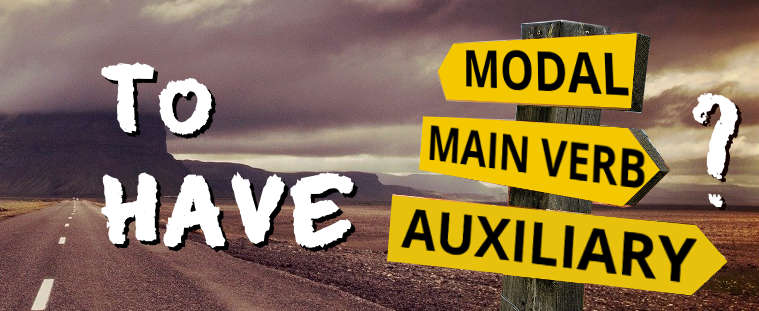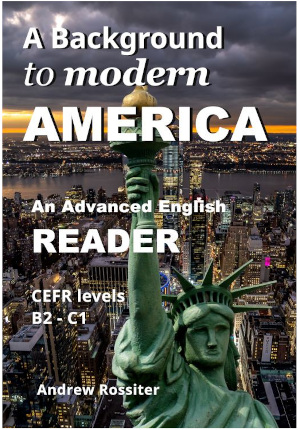The verb to have

| Index : | To have - main verb | To have - auxiliary | Have
to as a modal |
See grammar in a new light
 From
Amazon,
Barnes & Noble, Waterstones and good bookshops
From
Amazon,
Barnes & Noble, Waterstones and good bookshops1. The verb to have as a main verb
The main verb to have is one of the core verbs of the English language, and is principally used to express possession, ownership or acquisition.
In this usage, it is a transitive verb, and must therefore be followed by a direct object. The direct object of to have can be a noun, a noun group, a pronoun or a numeral.Examples of use of the verb to have as main verb
1.1 Affirmative forms of the main verb to have
| Person
|
1st / 2nd sing | 3rd sing | Plural |
|---|---|---|---|
| Tense | I / you | he, she, etc | we / you / they |
| Present. | have | has | have |
| Preterit | had
|
||
| .Present perfect | have had | has had | have had |
| Past perfect | had had | ||
Abbreviated forms of have:
As a main verb, have and has are not normally abbreviated , though shortened forms 've or 's are found in some common expressions such as "I've an idea".Abbreviated forms are more common with the present perfect and past perfect forms, but note that in this case it is the auxiliary that is shortened, not the main verb which always remains had. (Example: We'd all had a good time).
More examples below.
1.2. Negative forms of the main verb to have.
Take
care: The normal negative forms of the main verb
have / has are do not
have and does
not have, or their shortened forms. These are not
the
same as the normal negative forms of the auxiliary
or modal
verb have.
The forms haven't,
hasn't, (have not, has not) etc. are not
normally used as
negative forms of the main
verb have.
Contracted forms can be used in all styles of English, oral
and
written, except for the most formal.
| Person
|
1st / 2nd sing | 3rd sing | Plural |
|---|---|---|---|
| Tense | I / you | he, she, etc | we / you / they |
| Present. | do not have / don't have | does not have/ doesn't have | don't have |
| Preterit | did not have / didn't have | ||
| .Present perfect | haven't had | hasn't had | haven't had |
| Past perfect | hadn't had | ||
Exceptions: There are some exceptions where the negative form of the main verb have uses the negative structure of the auxiliary, notably some common expressions such as "I haven't a clue" (= I don't know) or "I haven't the time"; but even with this second possible exception, it would be more normal to say "I don't have (the) time" or "I haven't got time".
More examples of use of the verb to have as main verb
The doctor had a lot of experience.
He has three Rolls Royces and a Bentley. (ownership)
Where are the scissors? Do you have them ?
The house has eight windows and three doors.
I've had three phone calls so far today. (acquisition)
Before getting into his car, he'd had six glasses of whisky....
"Romeo and Juliet" is a tragedy; it doesn't have a happy ending.
I don't have any brothers or sisters.
We haven't had any complaints so far.
If he hadn't had those mushrooms, he wouldn't be ill.
1.3. Have or have got ?
Particularly in spoken English, have as a main verb, meaning own or possess or receive can be consolidated by adding the participle got. Here are the same example sentences, consolidated by got when this is a possible alternative – notably in the present tense.Replacing the past form had by got is a different question. Though it is sometimes possible when had means received (=acquisition), in other cases (in italics) this change of verb is either impossible, or will change the meaning of what is being said.
My father has got three brothers and two sisters.
The doctor had a lot of experience. (had = possessed)
The doctor had got a lot of experience. (had got= had acquired)
He has got three Rolls Royces and a Bentley.
Where are the scissors? Have you got them ?
The house has got eight windows and three doors.
I've got three phone calls so far today.
Before getting into his car, he'd had six glasses of whisky.... (had = drunk)
"Romeo and Juliet" is a tragedy; it hasn't got a happy ending.
I haven't got any brothers or sisters.
We haven't got any complaints so far.
If he hadn't had those mushrooms, he wouldn't be ill. (had = eaten)
2. The verb have as auxiliary
2.1. Past forms with have
The verb have is used as an auxiliary to form the present perfect and past perfect forms of other verbs.| Sample verb "walk" | 1st sing | 2nd sing | 3rd sing | Plural |
|---|---|---|---|---|
| Present
perfect |
I have walked | you have walked | he / she... has walked | we / you / they have walked |
| Past
perfect |
I had walked | You had walked | He/ she ... had walked | we / you / they had walked |
| Present perfect progressive | I have been walking | You have been walking | He / she... have been walking | we / you / they have been walking |
| Past perfect progressive | I had been walking | You had been walking | he / she ... had been walking | We had been walking |
Other tenses can be formed, including tenses with modal auxiliaries: examples
I will have walked ten miles today.
I could have been walking.
They must have been walking for ten hours.
2.2. Contracted forms of the auxiliary verb have.
As an auxiliary, have, has and had are frequently contracted to the forms 've, 's and 'd, when this is possible - i..e. after pronouns, but it depends on the type of English used.- In written English, contracted forms are possible but unusual after pronoun subjects; contracted forms are not used after noun subjects.
- In oral
/ spoken English contracted forms are normal but not
essential, after pronoun subjects, even in formal speech. Even the
Queen of England would be likely to say "I've had a good day",
rather than "I have had
a good
day."
However after noun subjects, contracted forms may be heard, even if they would not be written
For example,
A newspaper journalist would write "The Prime Minister has appointed a new team."
but a TV journalist would say: "The Prime Minister's appointed a new team."
2.3. Negative forms of the auxiliary verb have.
The standard negative forms of the auxiliaries have, has and had are haven't, and hasn't and hadn't.Example: I haven't finished my lunch. More examples below.
Take care: Forms using do (don't have, doesn't have etc) are never used as negative forms of the auxiliary verb have, only of the main verb have. (see above).
Regional variants:
A speaker from England will say : I haven't seen it but I hadn't told youbut a speaker from Scotland would be likely to say : I've not seen it, but I'd not told you
or even I havna seen it, but I hadna told you.
Ain't
Also note the word ain't, a popular alternative to haven't or hasn't, as used in the Rolling Stones' classic hit "I ain't got no satisfaction".2.4. Passive forms
Verb forms using the auxiliary have can also be put into the passive.| Sample verb "Take" | Present perfect passive | Past perfect passive |
| 1st sing | I have been taken | I had been taken |
| 3rd sing | He / she ... has been taken | He / she ... had been taken |
You could have been seriously injured.
They must have been dreaming.
Examples of use of the verb have as an auxiliary
The president has chosen his new team.
The president's chosen his new team (this form is possible in spoken language, but it would not normally be written)
The children had gone home five minutes earlier than usual.
The captain had told his team to play hard in the final minutes of the game.
The president has not yet arrived / The president hasn't yet arrived
Until I lived in London, I hadn't been on a double-decker bus.
Have you seen the light Mr. Jones ?
Hasn't the rain stopped yet ?
For information on "have to" as a modal verb, see Modals of obligation.


 Copyright
information.
Copyright
information.